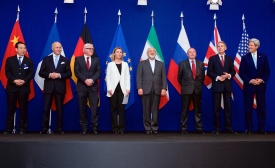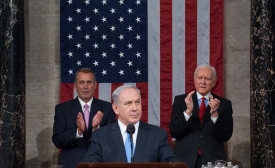israel
Iran's approach to foreign policy changed dramatically after Hassan Rouhani was elected President of Iran in 2013. The most serious and comprehensive negotiations regarding Iran’s nuclear program started in 2013 between Iran and six world powers including the United States. An interim agreement was reached on November 24, 2013. A framework agreement was reached on April 2, 2015. And finally, the comprehensive deal was reached on July 14, 2015 to ensure that Iran’s potential pathway to developing a nuclear weapon is blocked.

The Israeli campaign could be seen as classic public diplomacy – a government reaching out directly to a foreign public – or it could be seen as inappropriate interference that could produce an anti-Israel backlash. This is a line public diplomats should be wary about crossing. Even in the world of hardboiled foreign affairs, subtlety and restraint have value.

Philip Seib on Israeli intervention in America's highly partisan politics.
There is still time for Israel to change its course. But that is up to Israel to decide. For Jews who live in the Diaspora, however, we can also make a decision. We can decide that the choice is not between mindlessly supporting Israel in its drive to suicide and its daily practices of occupation, settlement expansion, and all the human rights violations that these necessarily imply on the one hand and silence on the other.
Though some museums shy away from the politics of art, hoping to keep them in separate realms, AMOCAH does no such thing. The museum’s opening exhibit directly addresses its community-oriented role. Titled "HIWAR," the word translates roughly into English as “dialogue,” but more precisely denotes a conversation between two plus people or parties working together toward a positive resolution without animosity.
Netanyahu will be reaching out to the American Jewish community in a live webcast next Tuesday, reports said, addressing the agreement and its implications for Israel, the Middle East and the world. A question and answer period will follow his remarks, according to an email invitation.
Since their fateful meeting the two teams have encountered one another on several occasions—most notably during the Opening Ceremony, when a delegate from Iran passed the torch to a delegate from Israel. Kirsten Suto Seckler, Chief Marketing Officer for the games said it was a deliberate decision by the Special Olympics organizing committee to “send a powerful message.”







